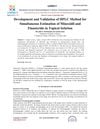 14 citations,
September 2015 in “Expert Opinion on Therapeutic Targets”
14 citations,
September 2015 in “Expert Opinion on Therapeutic Targets” The conclusion is that while oral contraceptive pills are effective for PCOS-related high androgen levels, new treatments with fewer side effects are needed.
 13 citations,
October 1993 in “International Journal of Dermatology”
13 citations,
October 1993 in “International Journal of Dermatology” Minoxidil effectively promotes hair regrowth in younger patients with small balding areas.
[object Object]  12 citations,
January 2010 in “Pediatric Health”
12 citations,
January 2010 in “Pediatric Health” Early treatment and lifestyle changes are important for managing PCOS in young people to prevent long-term health issues.
 3 citations,
March 2021 in “Metabolites”
3 citations,
March 2021 in “Metabolites” Hair loss causes differ between men and women due to changes in hormone levels and inflammation-related pathways.
 1 citations,
October 2013 in “Our Dermatology Online”
1 citations,
October 2013 in “Our Dermatology Online” 5α reductase type 2 enzyme mutation and oxidative stress may increase androgenetic alopecia risk in Egyptians.
 December 2023 in “Frontiers in endocrinology”
December 2023 in “Frontiers in endocrinology” Excess androgens may cause PCOS, not just be a symptom.
 May 2022 in “Pharmacognosy journal”
May 2022 in “Pharmacognosy journal” Moringa seed oil may help prevent hair loss and promote hair growth.
 January 2017 in “Elsevier eBooks”
January 2017 in “Elsevier eBooks” Sex hormones affect reproduction, sexual development, and oral health, and it's important for dental practitioners to understand their effects and interactions.
 50 citations,
February 2013 in “Annals of Clinical Biochemistry”
50 citations,
February 2013 in “Annals of Clinical Biochemistry” Understanding how DHT works is important for diagnosing and treating hormone-related disorders.
56 citations,
November 2007 in “Molecular and cellular endocrinology” Two enzymes regulate androgen receptor activity, affecting treatments for androgen insufficiency and benign prostatic hyperplasia.
 4 citations,
October 2020 in “Toxicology Mechanisms and Methods”
4 citations,
October 2020 in “Toxicology Mechanisms and Methods” Hesperidin protects rat testicles from finasteride damage and improves sperm health.
 17 citations,
May 1998 in “Steroids”
17 citations,
May 1998 in “Steroids” Researchers developed a model to predict how well certain compounds can block an enzyme related to hair loss and prostate issues, suggesting a 50 mg dose of finasteride might be effective based on lab and body data.
 56 citations,
April 1998 in “Steroids”
56 citations,
April 1998 in “Steroids” Finasteride reduces hair loss and treats BPH without major hormone changes, but may cause sexual dysfunction.
 23 citations,
July 1993 in “Pharmacotherapy”
23 citations,
July 1993 in “Pharmacotherapy” Finasteride treats enlarged prostate and baldness, but may cause limited urinary improvement and sex-related side effects.
 8 citations,
January 1991 in “European Urology”
8 citations,
January 1991 in “European Urology” Finasteride lowers DHT levels and raises testosterone in a dose-dependent way.
 June 2001 in “International Journal of Cosmetic Surgery and Aesthetic Dermatology”
June 2001 in “International Journal of Cosmetic Surgery and Aesthetic Dermatology” Finasteride improves hair growth in men with androgenetic alopecia.
 187 citations,
January 1994 in “The New England Journal of Medicine”
187 citations,
January 1994 in “The New England Journal of Medicine” Finasteride treats enlarged prostate and may help with baldness, but effects on sexual function and male fetuses are unclear.
 45 citations,
August 1994 in “Journal of Chromatography B: Biomedical Sciences and Applications”
45 citations,
August 1994 in “Journal of Chromatography B: Biomedical Sciences and Applications” Method detects finasteride in plasma and semen with high sensitivity and accuracy.
 37 citations,
January 1991 in “Reproductive Toxicology”
37 citations,
January 1991 in “Reproductive Toxicology” Finasteride reduces male rat fertility by causing issues with copulatory plug formation.
 10 citations,
February 2015 in “Journal of Pharmaceutical and Biomedical Analysis”
10 citations,
February 2015 in “Journal of Pharmaceutical and Biomedical Analysis” Finasteride's polymorphic form affects capsule quality and drug effect, requiring strict control.
 6 citations,
June 2010 in “Fertility and Sterility”
6 citations,
June 2010 in “Fertility and Sterility” Finasteride helps induce ovulation in nonresponder PCOS women.
 4 citations,
December 2011 in “Drug Research”
4 citations,
December 2011 in “Drug Research” Two finasteride tablet types are equally effective and can be swapped.
 2 citations,
January 2012 in “Journal of The Chilean Chemical Society”
2 citations,
January 2012 in “Journal of The Chilean Chemical Society” New method accurately measures finasteride in tablets and bulk.
 2 citations,
January 1994 in “Yakubutsu dōtai”
2 citations,
January 1994 in “Yakubutsu dōtai” Finasteride has different absorption and metabolism in male and female rats, with higher concentrations in certain organs and mostly excreted through feces.
 1 citations,
January 2017 in “Asian Journal of Chemistry”
1 citations,
January 2017 in “Asian Journal of Chemistry” New method effectively analyzes finasteride and its stability.
 December 2023 in “International Journal of Advanced Research in Science, Communication and Technology”
December 2023 in “International Journal of Advanced Research in Science, Communication and Technology” A reliable method was created to measure Minoxidil and Finasteride in a solution.
[object Object]  19 citations,
March 2019 in “Behavioural Brain Research”
19 citations,
March 2019 in “Behavioural Brain Research” Finasteride use can cause depression-like behavior in male rats.
 13 citations,
January 2015 in “Toxicology Letters”
13 citations,
January 2015 in “Toxicology Letters” Finasteride affects UGT1A4 enzyme, but not enough to cause issues when combined with other drugs.
 29 citations,
April 1995 in “Endocrinology”
29 citations,
April 1995 in “Endocrinology” Finasteride doesn't affect bone density in male rats.
 7 citations,
April 1995 in “Endocrinology”
7 citations,
April 1995 in “Endocrinology” Finasteride doesn't affect bone density in male rats.





























